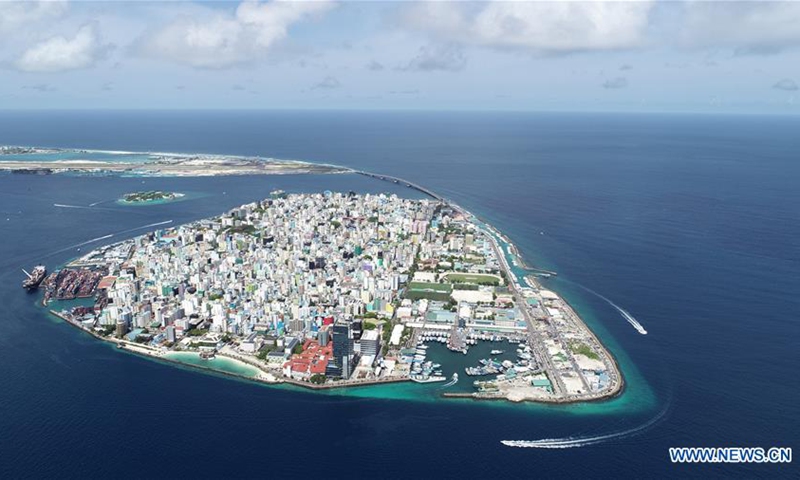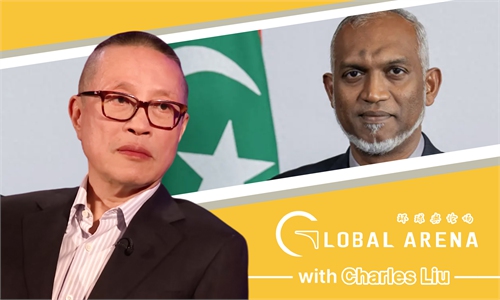Requesting India's troop withdrawal in line with Maldives' national security: expert

Aerial photo taken on September 1, 2019 shows the panoramic view of Male, capital of Maldives. File Photo: Xinhua
India completed its troop withdrawal from the Maldives on Thursday, a move that experts said aligns with international law and norms. The call for India to withdraw its troops reflects the sentiment of the Maldivian people and fulfills the country's need for national security and dignity, according to experts.
They also refuted the hype that associates the withdrawal with the Maldivian President's "pro-China" policy, attributing such hype to a perception of the country as not being an independent sovereign nation, but rather as being part of India's sphere of influence.
India's Ministry of External Affairs on Thursday confirmed the withdrawal of Indian military personnel from the Maldives and the "deputation of competent persons" to the archipelago nation, Indian news outlet NDTV reported.
The completion came after Maldives President Mohamed Muizzu's request that all Indian military personnel in the country be withdrawn from the Maldives by May 10, honoring a promise he made in his presidential campaign.
"The Maldives is a sovereign nation, and in accordance with international law and established norms, India should withdraw its troops," Long Xingchun, a professor at the School of International Relations at Sichuan International Studies University, told the Global Times on Friday.
The Maldives' call for India to remove its troops is viewed as a crucial step for safeguarding national security and upholding national pride, and the request was not solely the president's policy, but rather a reflection of the collective will of the Maldivian people, Long said.
The expert added that for India, failing to withdraw its troops will result in tarnishing its international reputation, as such actions would be perceived as aggressive. "Therefore, it is imperative for India to promptly withdraw its troops to avoid further damage to its national image," he said.
However, despite India's withdrawal of troops from the Maldives being an act in compliance with international law, many Indian and Western media outlets still associate it with Muizzu's so-called pro-China policy, ignoring the fact that the president himself has repeatedly stated that he is not "pro-China," but "pro-Maldives," and that Maldives is willing to cooperate with all countries, including India and China.
Long noted that the such hype stems from the fact that the Maldives is still seen as being within India's sphere of influence, which limits the country to only maintaining good relations and cooperating with India, rather than being recognized as an independent sovereign nation deserving of equal treatment.
"This perspective is fundamentally wrong, violates the UN charter and international law, and must be corrected," Long said, noting that as an independent sovereign state, Maldives has the right and the need to develop ties with other countries in the world, including China.
According to AP, a day ahead of India's troop withdrawal deadline, the foreign ministers of India and Maldives met in New Delhi, where Indian External Affairs Minister Subrahmanyam Jaishankar told his Maldives counterpart, Moosa Zameer, that India has been a key provider of development assistance, including infrastructure projects, medical care and health facilities.
Jaishankar also highlighted the close partnerships with neighbors as the world is today "passing through a volatile and uncertain period," Nikkei Asia reported.
Analysts noted that India has been a source of assistance and support for the Maldives, strengthening the bond between the two nations. However, they warned that it is important for India to recognize the importance of maintaining the relationship based on mutual respect and equality. "It is crucial for India to prioritize treating others with fairness and respect, rather than striving for a relationship of superiority over the Maldives," Long said.

